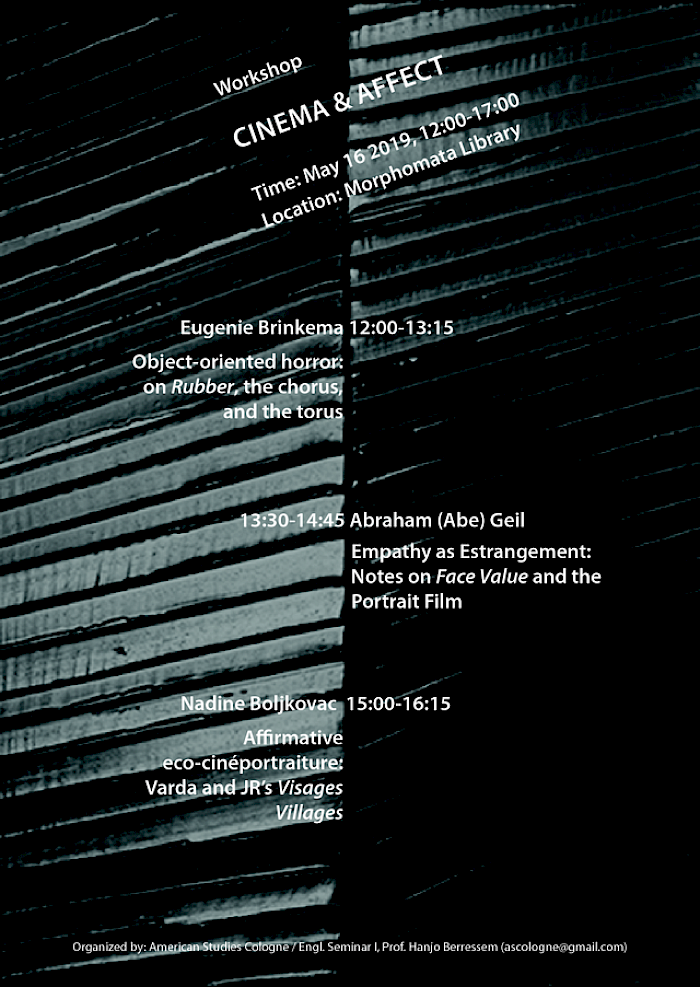Am 16. Mai 2019 sind unsere Alumna Nadine Boljkovac und das Department for American Literary and Cultural Studies mit einem Workshop über "Cinema and Affect" zu Gast bei Morphomata. Alle Interessierten sind herzlich willkommen!
Ort: Bibliothek des Internationalen Kollegs Morphomata, Weyertal 59 (Rückgebäude, 3. Etage), 50937 Köln
Zeit: 16. Mai 2019, 10–17 Uhr
Kontakt: Hanjo Berressem, moc.liamg@engolocsa
Teilnehmer:
EUGENIE BRINKEMA (PhD, Brown): “Object-oriented horror: on Rubber, the chorus, and the torus”
ABRAHAM (ABE) GEIL (PhD, Duke): “Empathy as Estrangement: Notes on Face Value and the Portrait Film”
NADINE BOLJKOVAC (PhD, Cambridge): “Affirmative eco-cinéportraiture: Varda and JR’s Visages Villages”
This workshop speaks to the recent “turn to affect” in the humanities. In the wake of this turn, particularly in North American academia, complicated and sometimes contentious debates have arisen that pertain to the politics, ethics and aesthetics of affect. In these discussions, affect tends to be considered either as a purely corporeal, non-discursive intensity that operates on a level that should be separated, at least conceptually, from that of culturally constructed, discursive emotions, or as something that shouldn’t be separated from the registers of signification and ‘reading’. Can one read affect or is it beyond reading? In light of these debates, might empathy come to function as a conceptual bridge between these two notions of affect? Might one create a bridge between the two by considering affect as the unconscious of emotion rather than as its other? This workshop looks at these and other questions in relation to the cinema as a stage for the presentation, or perhaps the embodiment of affect. Why are the affects under consideration so often negative and culturally excessive ones, such as the disgust triggered by works like John Waters’ 1972 Pink Flamingos? Does affect materialise and register as indistinct and quantitative, or can it also materialise by way of a film’s distinct, qualitative conceptual and formal architecture? To address these questions, this workshop brings together three vibrant scholars who, in associated yet divergent ways, have intervened, and are continuing to intervene, as seminal voices in explorations and considerations of cinematic and screen affect.
EUGENIE BRINKEMA (PhD, Brown): “Object-oriented horror: on Rubber, the chorus, and the torus”
Eugenie Brinkema is Associate Professor of Contemporary Literature and Media at the Massachusetts Institute of Technology and presently a fellow in Media Studies at the University of Amsterdam. Her book, The Forms of the Affects, won honorable mention in the Modern Language Association First Book Prize. Her current book project, Algebras of Sensation, explores the theoretical potential of radical formalism in relation to horror and love. Her talk explores the relation of cinematic form to the negative affective mode of horror to claim that horror tarries with violence on the way to expressing nearly nothing about the ethical. Reading the toroidal form of the killer tire in Quentin Dupieux’s 2010 film Rubber, Brinkema argues that the film stages a meta-formal thinking of two competing theories of affect only to disqualify both.
ABRAHAM (ABE) GEIL (PhD, Duke): “Empathy as Estrangement: Notes on Face Value and the Portrait Film”
Abraham Geil is Senior Lecturer in Film Studies at the University of Amsterdam. His work lies at the intersection of critical theory, aesthetics and film studies. His recent writing can be found in journals such as Polygraph, World Picture, and Screen. He is currently writing a book on the uses and abuses of the human face as a privileged site of recognition in film theory. His talk proposes a rethinking of the concept of empathy as a technique of estrangement through a reading of Johan van der Keuken’s late portrait film Face Value (1991). Valorized in liberal common sense as an essential moral attribute and social cure-all, empathy has become a target of attack in critical theory. Both sides of this debate share a notion of empathy as a site for intersubjective immediacy, and the human face in film has long been an object for the projection of such empathic immediacy as well as its contestation. By tracing a genealogy of empathy in relation to cinematic faciality, Geil’s talk argues for empathy as problematic of mediation and form in the first instance rather than a question of moral and psychological experience.
NADINE BOLJKOVAC (PhD, Cambridge): “Affirmative eco-cinéportraiture: Varda and JR’s Visages Villages”
Nadine Boljkovac, a recent fellow at the Morphomata Center (Cologne) and Center for Transformative Media (New School, NYC), is author of Untimely Affects: Gilles Deleuze and an Ethics of Cinema that examines affect through Chris Marker & Alain Resnais. A second book in progress, Beyond Herself: Postfeminist (Auto)Portraiture and the Moving Image, continues Boljkovac’s explorations of affective encounters through cinéportraiture. Recent and forthcoming works include “In [No] Home Movie Style” (author & co-editor, Screening the Past); “Screen Perception and Event: Beyond the Formalist/Realist Divide” (Anthem Handbook of Screen Theory); contributions to cinema and interdisciplinary collections, including Film-Philosophy. This talk assesses how Agnès Varda and JR’s Visages Villages (2018) can be explored as an affirmative, posthumanist eco-(self)portrait.
